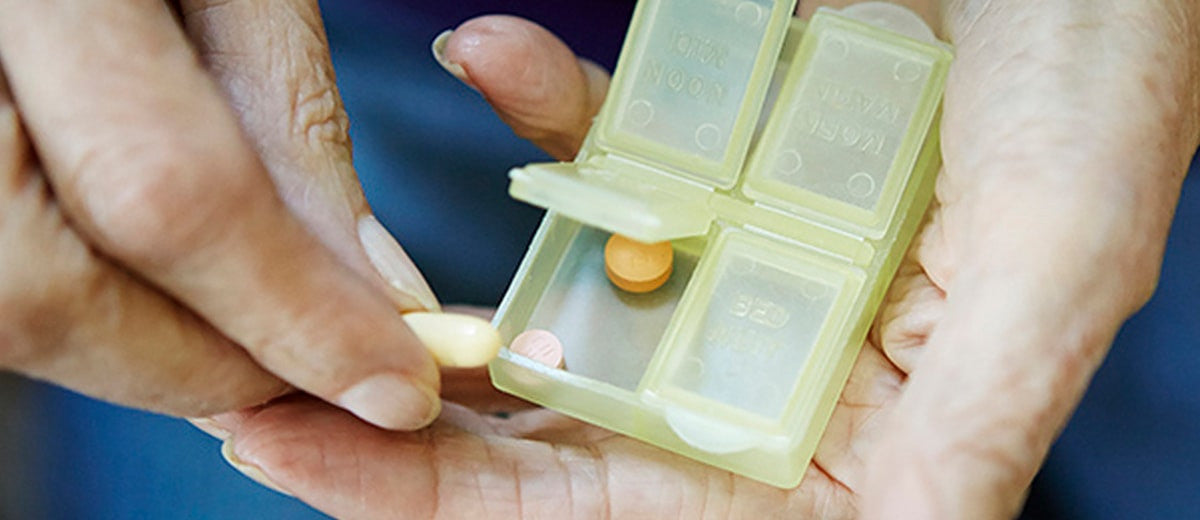800-487-3808
800-487-3808

Gas, bloating, pain, irregular bowel movements, and unexplained weight changes are just some of the common symptoms of poor digestion, with approximately 72% of Americans experiencing at least one symptom several times each month.
In particular, older adults often suffer from these distressing digestive complaints. The fact is, as we age, our bodies go through several changes. Not only does our ability to digest food diminish, but other factors like illness, medication, and inactivity all contribute to digestive issues.
Keep reading to discover some of the most common causes and simple cures for poor digestion.
A well-functioning digestive system is central to our health, so it’s not surprising that poor digestion can lead to an array of unpleasant symptoms, such as:
Weight loss that isn’t linked to calorie reduction, increased activity, or other medical conditions can be a symptom of a digestive issue, thanks to an inability to completely absorb nutrients.
On the other hand, poor digestion and weight gain may go hand in hand. Some digestive problems like slow bowel movements or food intolerances can cause weight gain.
Feeling bloated or excessively gassy after meals can indicate the body’s digestive system isn’t working as it should. In addition, medications to relieve symptoms of poor digestion can contribute to bloating.
Digestion doesn’t just involve breaking down food for elimination, it’s also the method by which the body absorbs the nutrients from what we eat.
Therefore, poor digestion can lead to a vitamin or mineral deficiency, including deficiencies in iron (anemia), vitamin B12, folic acid, calcium, and zinc. Protein absorption may also be affected.
Food sensitivities, irritable bowel syndrome (IBS), inflammatory bowel diseases (IBD), eating too much of one food type (e.g. too much fruit), or poor food combinations can lead to diarrhea.
Constipation may be caused by dehydration, IBS, food sensitivities, or other conditions.
Experiencing pain or cramping after eating may indicate overeating, a hidden food sensitivity, inflammation of the stomach lining (gastritis), or a medical condition.
 Heartburn can be a sure sign of poor digestion. Thankfully, there are plenty of simple remedies. ( Image Reference )
Heartburn can be a sure sign of poor digestion. Thankfully, there are plenty of simple remedies. ( Image Reference )
These symptoms can be as a result of too much, or too little, stomach acid. Food sensitivities, overeating, lying down after meals, and certain foods like alcohol or spices can also trigger heartburn and reflux.
While it’s common to feel tired after your Thanksgiving dinner, regularly feeling fatigued after meals suggests a slow digestive system—the body is conserving its energy for digestion and absorption.
It may surprise you to discover that skin conditions such as acne, dermatitis, psoriasis, or even dry skin can all begin in the gut! Though seemingly unrelated to digestion, these afflictions are linked to bacterial imbalances, difficulty digesting fats, and nutrient deficiencies.
Likewise, thinning hair or hair loss is often a consequence of issues with iron or vitamin B12 absorption.
Bad breath, or halitosis, can be caused by an imbalance of good and bad bacteria in the gut. For some people, eating sugary foods or dairy can increase bad breath symptoms because the bacteria feed off sugar.
Acid reflux and other digestive disorders may also contribute to halitosis.
Poor digestion and bacterial imbalance can lead to odorous substances from the gut being eliminated in sweat through the skin.
High-protein foods, particularly meat, can be difficult to digest and are often suspected of causing body odor. Some research indicates that people who don’t eat meat have a significantly more pleasant and less intense scent than meat eaters!
Evidence indicates that poor digestion contributes to the onset of rheumatoid arthritis (RA)—an inflammatory autoimmune condition—along with other inflammatory and autoimmune conditions.
Traditional Chinese medicine and naturopathic practitioners have long acknowledged this link between digestive issues and systemic inflammation. In more recent times, scientific research is increasingly linking autoimmune conditions to digestive health.
Your food and liquid intake have big impacts on the health of your digestive system. Some of the most common dietary causes of poor digestion are linked to:

Fiber is vital for a healthy digestive system, with a lack of fiber often being responsible for constipation. And since fiber fills you up without adding calories, it’s an important tool in weight management.
However, some people (such as those with Crohn's disease, chronic diarrhea, or cramping) may actually need a low-fiber diet—highlighting the importance of seeking professional advice before switching up your diet.
Food sensitivities encompass both food allergies and food intolerances. Although often used interchangeably, differences exist between the two.
Symptoms of food intolerances can come on several hours to days after eating the offending food, whereas true allergy symptoms are seen almost immediately. In addition, food allergies can be life threatening and triggered by a miniscule amount of food. On the other hand, intolerances can sometimes be eaten in small amounts, with only larger quantities causing issues.
The most common food sensitivities include:
Even if food sensitivities aren’t present, some people can feel worse after eating certain foods. While the foods that contribute to poor digestion vary from person to person, there are some common offenders, such as:
 Being dehydrated not only makes you feel terrible, it also contributes to poor digestion. Be sure to drink at least eight cups a day. ( Image Reference )
Being dehydrated not only makes you feel terrible, it also contributes to poor digestion. Be sure to drink at least eight cups a day. ( Image Reference )
A lack of water can cause constipation as stool dries out and becomes hard. Water is also necessary for stomach acid production.
What you put into your mouth is only one factor in poor digestion. Other reasons you may be suffering from digestive problems include:
We all know smoking is bad, but many people may not realize it affects every system in the body—including the digestive system. Smoking contributes to heartburn, GERD, peptic ulcers, Crohn's disease, stomach cancer, and pancreatitis.
Countless studies show the importance of maintaining a healthy balance of bacteria in the gut. Not enough "good bacteria," known as probiotics, leads to poor digestion, skin disorders, weight problems, food allergies, and autoimmune conditions.
In fact, approximately 80% of the immune system is located in the gut—so maintaining a healthy balance of gut bacteria is vital to stave off all kinds of illnesses.
Additionally, these probiotics produce certain B vitamins that help metabolize the food you eat.
Hypochlorhydria, or low stomach acid, is common in people over forty, as stomach acid production declines with age. Although too much stomach acid is often blamed for heartburn and reflux, research suggests that over 90% of people with these symptoms have too little stomach acid!
Without adequate stomach acid levels, protein digestion is inhibited, nutrients cannot be absorbed, the risk of pathogens and illness increases, and symptoms of poor digestion are experienced.
Similarly, digestive enzyme production decreases with age.
As mentioned, digestion begins in the mouth. If food isn’t chewed properly during this first step, the body has to work extra hard to break down food in the stomach and intestines.
Stress levels can be high in older adults—and contribute to poor digestion. Feeling stressed or anxious can lower stomach acid production, affect gut bacteria, and cause the flare-up of ulcers, IBS, and inflammatory conditions.
Exercise benefits all parts of the body, and the digestive system is no exception. Regular movement improves the efficiency of the digestive process, stimulating the muscles of the intestinal tract and preventing constipation.
In addition, some research suggests that exercise may alter the bacterial balance in the gut!
 our medication may be sabotaging your digestive system. Talk to your doctor to find the best course of action. ( Image Reference )
our medication may be sabotaging your digestive system. Talk to your doctor to find the best course of action. ( Image Reference )
Older adults may take several different medications, many of which can cause an upset stomach, bloating, constipation, diarrhea, heartburn, ulcers, and more.
Several digestive conditions can affect health and produce many of the symptoms of poor digestion listed above. These include:
GERD is diagnosed when a person suffers heartburn more than twice a week. If left untreated, GERD can cause ulcers and permanent esophageal damage.
GERD is characterized by recurrent heartburn, belching, a sour taste in the mouth, and difficulty swallowing. Other symptoms include a sore throat, wheezing, hoarseness, and a chronic cough.
Celiac disease is a serious condition that causes damage to the small intestine when gluten (found in wheat, rye, and barley) is eaten. It is believed to affect 1 in 100 people worldwide, and it tends to run in families.
Some people with Celiac disease don’t experience any symptoms, but those who do may have iron-deficiency anemia, fatigue, pain, migraines, arthritis, or bone loss. Adults with Celiac disease are less likely than children with the condition to experience digestive-related symptoms.
IBS is a functional disorder of the digestive tract. This means the tract looks normal and there is no inflammation, but it does not function correctly. Common symptoms are stomach pain and cramping, diarrhea, constipation, bloating, and gas.
IBD is the term given to a group of inflammatory conditions—including ulcerative colitis and Crohn’s disease—which cause damage to the digestive system. Although often confused with IBS, inflammatory bowel disease is much more serious.
According to the Crohn’s and Colitis Foundation, up to 1.6 million Americans are affected by IBD. It should be noted that the majority of these cases are diagnosed before the person is thirty years old, although some people may not receive a diagnosis until they are much older.
Symptoms include blood in the stool, diarrhea, pain, cramps, nausea, and difficult bowel movements.
Other common digestive conditions and issues experienced by older adults include:
Although many factors contribute to poor digestion, you can take some simple steps to relieve digestive distress and improve symptoms. Let's talk about what to do for good digestion.

For good digestion, steer clear of processed, packaged foods. Instead, opt for fresh foods that taste good, too. (Image Reference )
Reduce the strain on your digestive system by steering clear of processed foods. They’re high in fat, which can be difficult to digest, and the high sugar content contributes to bacterial imbalance in the gut. Countless flavorings, colorings, and preservatives can cause an upset stomach.
Choose whole foods instead. Aim for at least five servings daily of fiber-rich fresh fruit and vegetables, and focus on whole-grains, fish, lean meats, or protein sources like tofu and beans. However, always pay attention to your individual needs, and avoid any foods that cause symptoms.
Remember to drink plenty of water, too!
Quitting smoking, reducing stress, getting enough sleep, and staying active are some of the choices you can make to benefit not just your digestive system, but your whole body.
Taking care of your teeth as you age is an important part of healthy digestion because healthy teeth mean you can chew your food more thoroughly.
Brush and floss every day, and visit your dentist regularly.
If you can’t pinpoint the source of your digestive distress, it’s worth considering the possibility of a food intolerance.
Unmasking hidden intolerances can be done using laboratory tests, although an elimination diet is generally considered the "gold standard" of diagnosis.
An elimination diet involves removing certain foods and common allergens for 21 to 28 days, before slowly reintroducing them one at a time, and noting any adverse reactions to specific foods.
People with low stomach acid, or those who have trouble digesting certain foods, can benefit from supplementing with digestive enzymes.
These supplements can be found in health stores and are often made with natural fruit extracts. Always choose an enzyme product containing proteases, lipases, and amylases to facilitate the breakdown of proteins, fats, and carbohydrates.
Home remedies like raw apple cider vinegar in water or herbal bitters can also help stimulate the digestive juices before meals.
Also try ginger shots to improve digestion. Click here to learn why ginger is amazing.
 Fermented foods are sure to improve your digestion. Plus, it can be fun to branch out and try new foods in the process. ( Image Reference )
Fermented foods are sure to improve your digestion. Plus, it can be fun to branch out and try new foods in the process. ( Image Reference )
The term "probiotics" not only refers to the beneficial bacteria found naturally in the gut, but also to the foods and supplements which contain these bacteria. Probiotics can be taken in capsule form every day to aid digestion and to naturally augment the bacteria in the body.
Try to eat one or two servings daily of fermented foods, which are naturally high in probiotics. These include kefir, kimchi, kombucha, miso, sauerkraut, and tempeh. You can make many of these at home or purchase them from a health store.
Prebiotics are non-digestible carbohydrates that "feed" the beneficial bacteria. Artichoke, asparagus, bananas, garlic, onions, and tomatoes are all prebiotic foods. However, people with certain digestive conditions like Crohn’s disease have trouble with prebiotics.
Medical conditions that affect the digestive tract can be managed through a variety of lifestyle and dietary modifications, as well as with medication.
If you have been diagnosed with a condition like irritable bowel syndrome, ulcerative colitis, or GERD, you should work with a health professional to devise a treatment plan that helps you best manage your symptoms.
If you experience any of the symptoms of poor digestion on an ongoing basis, it’s important to see your doctor for an accurate diagnosis to inform treatment planning.
Certain symptoms, such as rectal bleeding, anemia, significant weight loss, fever, or vomiting, should be dealt with immediately, as they can indicate more serious conditions and can lead to complications if left untreated.
You should also consult your doctor straight away if symptoms get progressively worse or change abruptly.
According to Ayurvedic principles, the most important factor in overall health is a well-functioning digestive system.
By learning the symptoms associated with poor digestion, eating a balanced diet, and making smart lifestyle choices, you can take care of your digestive tract and enjoy good health right into old age.
Sources:
https://academic.oup.com/chemse/article/31/8/747/364338/The-Effect-of-Meat-Consumption-on-Body-Odor
https://www.ncbi.nlm.nih.gov/pubmed/22109896
https://celiac.org/celiac-disease/understanding-celiac-disease-2/what-is-celiac-disease/
Leave a comment